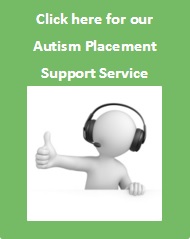Over the past few years, legislation has been passed and guidance has been published to assist people with an autistic spectrum condition get the diagnosis and support they need. However, many people are still unaware of their autism rights and they do not know when they are given misinformation. This article gives some basic information for both children and adults with autism on their rights. For the purposes of this article the word ‘autism’ will encompass autistic spectrum disorders, autistic spectrum conditions, Asperger’s Syndrome and PDD-NOS.
Diagnosis for children and young people
In September 2011 NICE (National Institute for Health and Clinical Excellence) published guidelines for a diagnostic pathway for children and young people suspected of having autism. These guidelines stipulate that:
- Each locality should have an autism multi-agency strategy group
- Each strategy group should have a lead professional responsible for the local autism pathway for recognition, referral and diagnosis of children and young people
- The strategy group should set up a multi-disciplinary autism team to include a paediatrician and/or child and adolescent psychiatrist, a speech and language therapist, a clinical and/or educational psychologist
- There should be a single point of referral to the autism team
- A case co-ordinator should be identified within each autism team for each child or young person who is to have an autism diagnostic assessment
If you are having difficulties in getting a diagnosis through your GP, consider contacting your Local Authority to find out who is in charge of referrals to the local autism team and contact them directly.
Diagnostic assessments for children and young people
- Diagnosis is usually for children older than 3 years; however, if there is regression in language or social skills then it is possible to get a diagnosis earlier.
- A diagnostic assessment should be carried out within 3 months of the referral to the autism team
- If the child or young person has a diagnosis of autism, they should be offered a follow-up appointment with an appropriate member of the autism team within 6 weeks of the end of the autism assessment for further discussion.
Diagnosis for adults
 The Autism Act, 2009, and subsequent Autism Strategy: Fulfilling and Rewarding Lives, refer to the NICE Guidelines entitled Autism:
The Autism Act, 2009, and subsequent Autism Strategy: Fulfilling and Rewarding Lives, refer to the NICE Guidelines entitled Autism:
recognition, referral, diagnosis and management of adults on the autism spectrum.
These guidelines stipulate that an assessment of possible autism should be carried out if the person has “one or more of the following”:
- Persistent difficulties in social interaction
- Persistent difficulties in social communication
- Stereotypic (rigid and repetitive) behaviours, resistance to change or restricted interests, and
One or more of the following:
- Problems in obtaining or sustaining employment or education
- Difficulties in initiating or sustaining social relationships
- Previous or current contact with mental health or learning disability services
- A history of a neurodevelopmental condition (including learning disabilities and attention deficit disorder) or mental disorder” (1.2.2)
If two or more of the above difficulties are being experience then a comprehensive assessment should be offered. A comprehensive assessment of autism would include diagnostic, risk and needs assessments.
If you are experiencing two or more of these difficulties and you are not offered a comprehensive assessment of autism, ask your GP or a health professional for one.
Post diagnosis for children
Once a child has received a diagnosis, the NICE guidelines state that information should be provided to prepare for the future and contact details should be given for local and national support organisations. If you are not given any contact details ask the autism team.
At school, if your child’s difficulties make it harder for them to learn or access education, it is important to get help straight away. The school should use the Special Educational needs Code of Practice to assess your child’s needs and to guide the school in how best to meet your child’s needs.
If your child’s teacher or their SEND (Special Educational Needs or Disabilities) co-ordinator feels that your child needs support from outside the school, such as speech and language therapy, they will get help through SEN support. If you are not told about this, please ask.
Sometimes, schools cannot fully meet the needs of your child. In that case, you can apply to your local authority for a EHC Plan (Education, Health and Care Plan). This assessment will help to identify in detail your child’s needs. The local authority has a legal obligation to respond to your request within 6 weeks. Once the assessment has been carried out, a EHCP (Education, Health and Care Plan) will be written. The plan should be produced within 20 weeks of the request for assessment. This plan will help you to access extra support. Sometimes however, the local authority decides not to write a plan. In this case they should always explain why and they should let you know within 16 weeks of the date they received the request for an assessment . You have a right to appeal to the Special Educational Needs and Disability Tribunal. If you decide to appeal it is important to do this within the time limit you are given by the local authority.
Post diagnosis for adults
The Autism Strategy (2010), Fulfilling and rewarding lives, states that “diagnosis alone is not enough: the fundamental change we want to see is that diagnosis leads to a person-centred assessment of need, in line with the Care Act 2014.
The aims of the Autism Strategy (2010) have been reinforced and more detailed guidance was provided in the Autism Strategy Update (2014), Think Autism. In March 2015 the Department of Health published the Statutory guidance for Local Authorities and NHS organisations to support implementation of the Adult Autism Strategy. These guidelines cover:
- Training of staff who provide services to adults with autism
- Identification and diagnosis of autism in adults, leading to assessment of needs for relevant services
- Planning in relation to the provision of services for people with autism as they move from being children to adults
- Local planning and leadership in relation to the provision for adults with autism
- Preventative support and safeguarding in line with the Care Act 2014 from April 2015.
- Reasonable adjustments and equality
- Supporting people with complex needs, whose behaviour may challenge or who may lack capacity
- Employment for adults with autism
- Working with the criminal justice system
Under Section 9 (3) of the Care Act 2014, the local authority must carry out an assessment of needs wherever it appears that an adult has needs for care and support regardless of the adult’s financial resources and regardless of whether the local authority believes the adult has eligible needs or not. An individual can request this assessment.
Therefore, if you believe you are in need of services you can ask for an assessment from your local authority.
 An assessment of someone with autism should be carried out by a trained practitioner and take into account their communication needs. It is important to note that an assessment cannot be denied on the basis of a person’s IQ.
An assessment of someone with autism should be carried out by a trained practitioner and take into account their communication needs. It is important to note that an assessment cannot be denied on the basis of a person’s IQ.
Furthermore, the Strategy states that a “diagnosis of autism should be recognised as a reason for assessment” (3.14) and also “where someone has previously had a needs assessment, and is then diagnosed as having autism, this should be recognised as a potential reason for reassessment” (3.18).
This means that if you receive a diagnosis of autism you can request a ‘needs assessment’ from a trained practitioner who has a good knowledge of autism.
A ‘needs assessment’ is required to access funding for support and services. However, a diagnosis of autism is not a guarantee of support or services. This is determined by the ‘needs assessment’.
Equally, an adult does not have to have a diagnosis to ask for an assessment of needs.
If you are an adult with continuing health needs within the NHS, from April 2014 you can ask for a personal health budget, including a direct payment. From October 2014, if you are receiving NHS Continuing Healthcare you ‘have the right’ to have a personal health budget and you should ask your GP about this.
Transitioning from childhood to adulthood
 Children who have a SEND (Special educational need or disability) have to have transition planning by the local authority from Year 9 at age 13 or 14.
Children who have a SEND (Special educational need or disability) have to have transition planning by the local authority from Year 9 at age 13 or 14.
Local authorities have a duty under both the Children and Families Act 2014 and the Care Act 2014 to carry out an assessment for all children with a SEND going on to further education or training in order to form transition plans. Transition plans have to be tailored to the needs and wishes of each individual and should be reviewed and updated each year.
A child with autism in transition should be offered a community care assessment. If this assessment is not offered, then ask your local authority’s autism team.
If your child is going to college, the college has an obligation to make ‘reasonable’ adjustments for their special individual needs. If the ‘reasonable’ adjustments are not sufficient, there are special colleges which cater specifically for the needs of people with disabilities or learning difficulties. Funding for these colleges, which are often independent, can be accessed through the Education Funding Agency.
Conclusion
Most local authorities now have in place an autism team for adults and for children. If you are concerned that either a child or an adult has autism and you would like a diagnosis, first ask your GP. If your GP is unable to help, contact the autism team for your locality direct. Every local autism team should have access to a diagnostic team.
If you feel a child needs support in school, ask the school for an assessment for a Education, Health and Care Plan. You do not have to have a diagnosis of autism to request one.
If you feel an adult is in need of community support and services, ask your local authority for a ‘needs assessment’. If an adult is in need of continuing NHS care, ask your GP about personal health budgets. You do not have to have a diagnosis of autism to request either the ‘needs assessment’ or the personal health budget.
If you would like further guidance, you can also contact the Living Autism team on 0800 756 2420 or info@livingautism.co.uk.
Legislation and Guidance
Autism Strategy: Fulfilling and Rewarding Lives, 2010.
Children and Families Act 2014.
NHS (Direct Payments) (Amendments) Regulations, 2013.
NICE Guidance, Autism in under 19s: recognition, referral and diagnosis (2011).
NICE Guidance, Autism in adults: diagnosis and management (2012).



